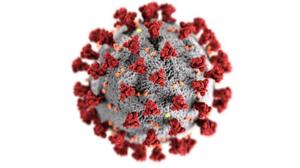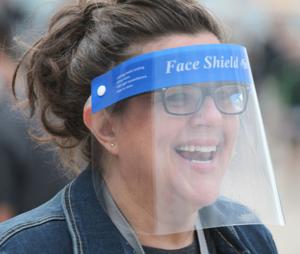Gloves and sticks flew through the air as Minnetonka hockey players rushed to the home side of the ice. A pile of Skippers in the goal crease as they celebrated a 2018 state boys title over Duluth East. 
Library: Six words to describe 2020
How was 2020? 
Outdoors: How the muskrat got its name
This winter has been a bit strange in the northland where I reside. Not much snow but enough cold temperatures to start freezing the lakes. The small lakes and ponds freeze up tight right away, but the larger lakes have… 
Practices first, games next?
With Wednesday’s Executive Order 20-103 by Minnesota Governor Tim Walz, the Minnesota State High School League will begin in-person practice for winter sports and activities on Monday, Jan. 4, 2021. 
Re-opening of District 112 elementary schools a possibility next month
Celi Haga, Director of Communications for Eastern Carver County Schools, first heard the reports on social media the night of Dec. 15. Governor Walz’s speech the following day was going to include a push to re-open elementary schools. 
Get Your New Year’s Eve Party Pack!
To register, click HERE

Bars, gyms, schools, social gatherings: Here are some of the new restrictions
Minnesota Gov. Tim Walz Wednesday afternoon will announce a series of new coronavirus restrictions. 
Four Carver County COVID deaths reported Dec. 16
Four more Carver County deaths due to COVID-19 were reported Wednesday, Dec. 16. 
Total togetherness amid ‘total loss’: Carver couple grateful after house fire
Last Friday, Dec. 11, Diane Foster and husband Phil Ives had a backyard fire at their Carver Bluffs home. 
Nearly half of Carver County COVID deaths have happened in December
Carver County COVID-19 statistics, provided by Eric Sieger, county communications manager on Dec. 21: 
Carver County COVID statistics for Dec. 14
Carver County COVID-19 statistics, provided by Eric Sieger, county communications manager on Dec. 14: 
Minnetonka tennis coach Dave Stearns dies unexpectedly
Dave Stearns, tennis coach for 59 years between boys and girls teams at Minnetonka High School, died unexpectedly at his Carver home on Saturday, Dec. 12. He was 72 years old. 
Arts Consortium of Carver County sponsors Flash fiction contest
Flash Fiction 2021, a writing contest sponsored by the Arts Consortium of Carver County opens for submissions beginning Jan. 1. 
Carver Elementary School staff receives Osterdyk Community Service Award
Principal June Johnson has plenty of accolades to laud on the Carver Elementary School staff for its efforts in assisting displaced residents of a recent apartment fire. 
Protecting Water Through Winter
 It may not look like a Minnesota winter yet, but soon enough we’ll be covered in snow. It is still important to protect lakes and rivers from pollution during the colder months. Even when it is cold, pollutants from our lawns and driveways can still run down through stormdrains and into lakes and rivers. Follow these four tips to keep your favorite lake or river healthy and ready for recreation next summer:
It may not look like a Minnesota winter yet, but soon enough we’ll be covered in snow. It is still important to protect lakes and rivers from pollution during the colder months. Even when it is cold, pollutants from our lawns and driveways can still run down through stormdrains and into lakes and rivers. Follow these four tips to keep your favorite lake or river healthy and ready for recreation next summer:
Don’t let winter waste make spring messes
Cold temperatures and frozen water don’t slow down a pup’s digestive system. Continue to pick up pet waste through the winter to prevent bacteria and pathogens from getting into lakes and rivers. It’s easy to let it pile up, but come spring those frozen piles will melt and make a real mess!
Be a good fisherman
Whether you visit a lake once or set up a second (fishing) home for the season, please remember the “leave no trace” motto and take everything you bring onto the lake back with you when you leave. Everything that’s left on a lake’s frozen surface ends up in the water below when ice-out occurs leading to safety and public health issues.
Shovel before salt
Shovel first and shovel often during snowstorms. If you get the pavement clear, there is no snow to become compacted and turn to ice. This is the most effective method for safe walkways. Lastly, pay attention to temperature. Rock salt doesn’t work well when the temperature is below 15⁰F. Keeping areas clear through shoveling and scraping is your best bet in cold temperatures.
Stay safe on ponds with unpredictable ice
Keep yourself and your family safe. It’s never safe to skate or walk on a frozen pond. Ice thickness on small stormwater ponds is not as certain as ice that forms on natural lakes. It is constantly changing as runoff and drainage water flow through the ponds all year long. With the unpredictability of water movement and impacts of road salt, it is best just to stay off ponds.
New director of Equity and Inclusion in District 112
Robin Gordon has been named the next director of equity and inclusion in Eastern Carver County Schools. Gordon will start on Dec. 18, succeeding Dr. Keith Brooks, who departed the district in late October. 
Explore “Nature Illuminated” at the Minnesota Zoo
Art, light and animals come together for a one-of-a-kind exhibit open now through Jan. 17 at the Minnesota Zoo in Apple Valley. 
What is the 2020-21 academic bowl season continues?
If members of academic bowl teams around the country found themselves watching “The Greatest of All-Time” tournament on the game show Jeopardy last January, they would have been pulling hard for the underdog. 
Commentary: Coulda, woulda, shoulda – sound familiar?

Commentary: May be time to update community values
I had a conversation about the term “community.” What the conversation pointed out to me was that the term needs some definition as to what it means when I use it. 
